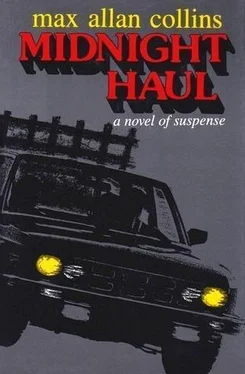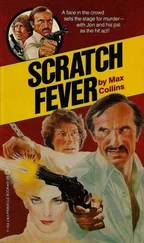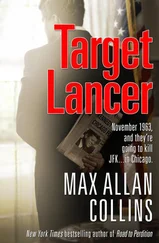Another uneventful half hour passed.
“I don’t know about this,” Crane said. “We haven’t seen a car or truck since we got here.”
“Crane, if we’re patient, we can catch them in the act. You got that? We can wait and watch for the sons of bitches who are hauling Kemco’s shit, follow them to wherever they’re illegally dumping it...” She paused to point at the Nikon SLR camera on the floor between her feet. “... take a few nice candid shots, and we got them.”
“And you’re sure this is going to happen at night.”
“It will probably be at night. They aren’t called midnight haulers because they work days.”
“It doesn’t look like tonight’s going to be the night.”
“It’s too early to tell. But tonight might be the night. Or tomorrow night, or the next night, maybe. This place turns out a lot of waste. We won’t have to wait forever.”
“That’s encouraging.”
“Take a nap. I’ll wake you if anything happens.”
“Don’t let me sleep more than eight or ten hours.”
“Crane, we only have to watch a couple hours a night. Between midnight and two, is all.”
“I still don’t know how you arrived at that.”
“I guessed, okay? But they would probably wait till after third shift went on at 11:30, and, if they’re going any distance at all to do the dumping, they wouldn’t want to get started any later than two.”
“I guess that makes sense.”
“Take a nap.”
“Okay.”
Crane got as comfortable as he could in the Datsun, with her in the driver’s seat. He was following her lead in this because he didn’t know quite what else to do; she had the information, the insights, he needed. So he was going along with her on this effort to link Kemco with “midnight haulers.” But it seemed to him ill-advised at best; and he didn’t want to think about what it was at worst.
This afternoon, at Boone’s, he’d listened to three cassette tapes — interviews with the wives of the three other suicide victims — and he’d found that, for a “journalist” who’d been working on a book for a year and a half, Boone had somewhat less than a professional interviewing style. She pushed her subjects, led them, tried to get them to help her make her preconceived points. (She had not interviewed any of the members of the Brock family — Mr. Brock being the man who killed his wife and two children and himself — as there was no one left to interview.)
Despite her lack of professionalism in interviewing, Boone was an amazing researcher and, from what he’d read so far, her writing style was considerably less hysterical than he’d supposed. Actually, it was a nicely understated style, getting her anti-Kemco points across convincingly. The Agent Orange section of the manuscript alone was devastating — her interviews with Vietnam vets were much more effective than those with Greenwood residents — and she may have been wrong in assuming the book could not stand on Agent Orange alone to find her a publisher.
He was halfway through the manuscript and would finish it tomorrow; but he would need days to absorb Boone’s file cabinet of data on Kemco’s adverse effects on the citizens of Greenwood.
She had cooked supper for him, and it was delicious: lasagna, his favorite. They — Crane, Boone, Billy — ate in the kitchen, a big off-white room with plants lining the windows. Her husband had been nice enough to leave her all the appliances, but then most of them were built-in.
“This is really good,” Crane told her, between bites.
“You sound surprised.”
“It’s just great. I hope you’ll let me help out on the groceries, while I’m here. And I can do some of the cooking, if you like.”
“You can cook?”
“Isn’t that kind of a ‘sexist’ question?”
Boone smiled. “What’s your specialty?”
“I’m glad you like Italian,” he said. “I do terrific spaghetti and meatballs.”
“Sounds wonderful. Only I’m a vegetarian.”
“Really.”
“You don’t sound surprised.”
“Well, I noticed the lasagna was meatless, of course, but, then I fix it that way myself. I like it with spinach and cottage cheese like this.” He turned to the boy. “Are you vegetarian, Billy?”
“No!” the boy said. He was looking at his plate as he ate.
“I fix Billy hamburgers or tacos, when he wants,” Boone explained. “I don’t try to force vegetarianism on him. It’s not a religion with me.”
“Daddy feeds me steak,” Billy said. Still looking at his plate.
“Daddy can afford steak,” Boone told her son.
“How long are you going to live here?” Billy asked Crane, turning and looking at him for the first time. His expression was that of a prosecutor with an accused mass murderer on the stand.
“Just a little while, Billy,” Crane said.
“Daddy won’t like it,” Billy said.
“Daddy won’t know about it, either,” Boone said.
“I might tell him.”
“Not unless you don’t want to live with mommy anymore.”
“I might live with Daddy. If he’s gonna live here, I might.”
“Mr. Crane is my friend, Billy. He’s helping me work. He won’t be staying here long.”
“He better not.” Billy pushed away from the table. “Be excused?”
“Yes, Billy.”
Billy left the table.
“He’s a charmer,” Crane said.
“He’s not a bad kid. He doesn’t like Patrick and me not living together.”
“Well. No kid in his situation likes that.”
“I don’t think Billy’s going to warm to you, Crane. You might as well get used to it.”
“It doesn’t bother me. I’ve lived with younger brothers. I can put up with it.”
“Good. Thank you.”
“Now that Billy’s gone, there’s something I need to ask about your husband.”
“Yes?”
“How much does he know about this book you’re doing?”
“Nothing, really. Patrick knows I’m writing a book, but he’s never bothered to ask what about. Which is fine with me. As far as I know, nobody at Kemco knows what I’m up to, exactly. And now that ‘suicides’ are becoming an epidemic around here, that’s probably a good thing.”
Earlier she’d told him that she had not yet confronted Patrick with what she knew Mary Beth had seen: that exchange of money between him and a questionable-looking trucker. Now looking across the kitchen table at her, in the house she’d lived in with her husband, Crane could see that as much as she disliked Patrick, as much as her hatred for Kemco was tied in with how she felt about him, she didn’t like thinking Patrick might’ve been part of what happened to Mary Beth.
“This afternoon,” Crane said, “I tried to absorb as much information as I could.”
“I know.”
“I’m just getting started, really. But already something is bothering me.”
“What bothers you?”
“The ‘suicide’ victims. Okay, they all worked at Kemco. But otherwise I see no connection... we have a maintenance man, a foreman, an executive. Then there’s Mary Beth — a secretary, temporary summer help.”
“So?”
“It’s just that the list is too disparate. It’s not a group of people working together, in similar jobs, with similar access to information.”
“They all worked at Kemco. That’s connection enough.”
“No it isn’t. As you’ve said, everybody around here works at Kemco. What other connection did they have? Boone, I’m going to talk to the wives of those ‘suicides’ myself.”
“Fine.”
“Alone.”
“That’s fine, too.”
“You see, I don’t share your basic assumption that Kemco is evil. That all big business is the enemy of the people. I just don’t buy that naive leftist bullshit, okay?”
Читать дальше












